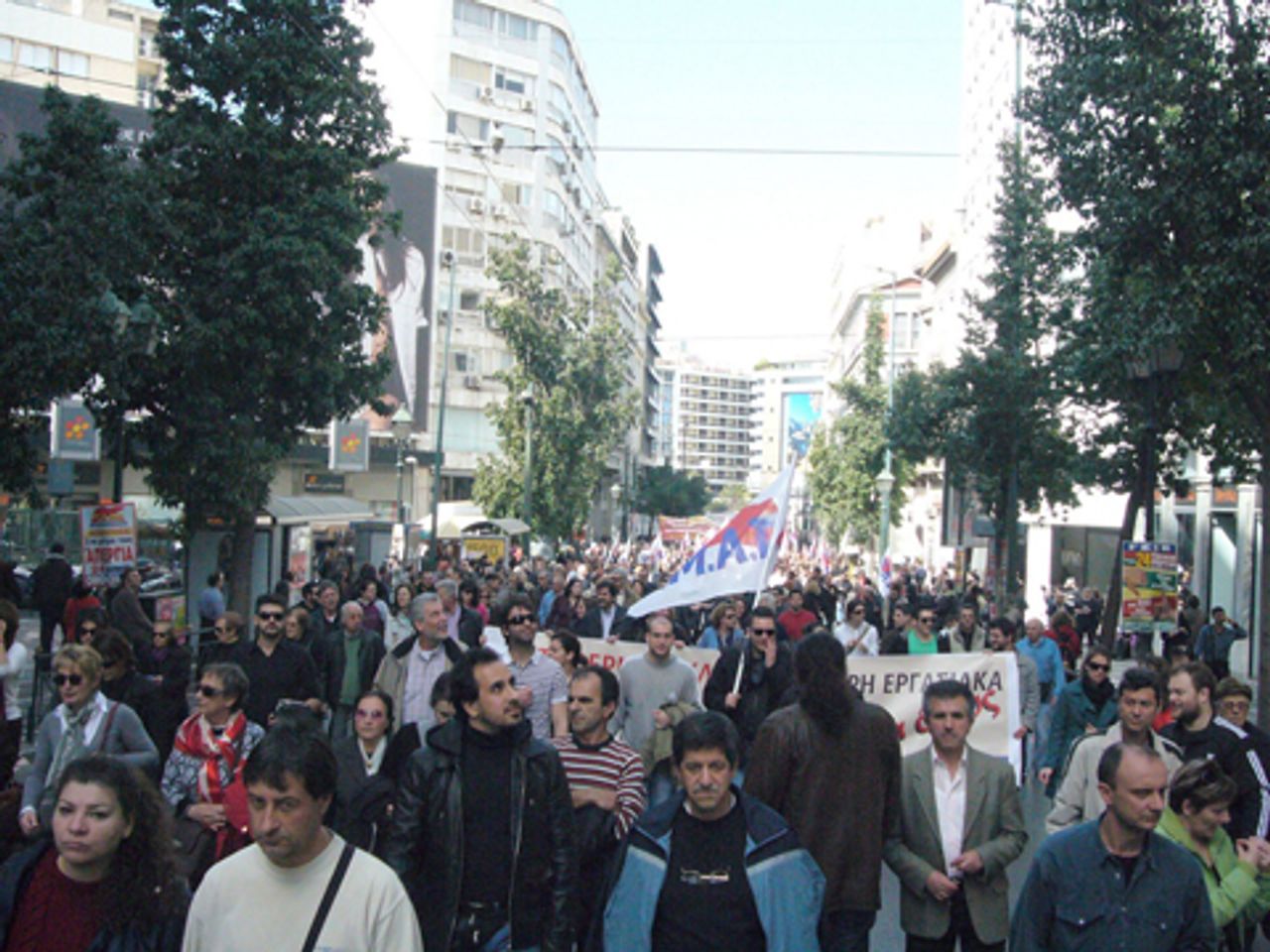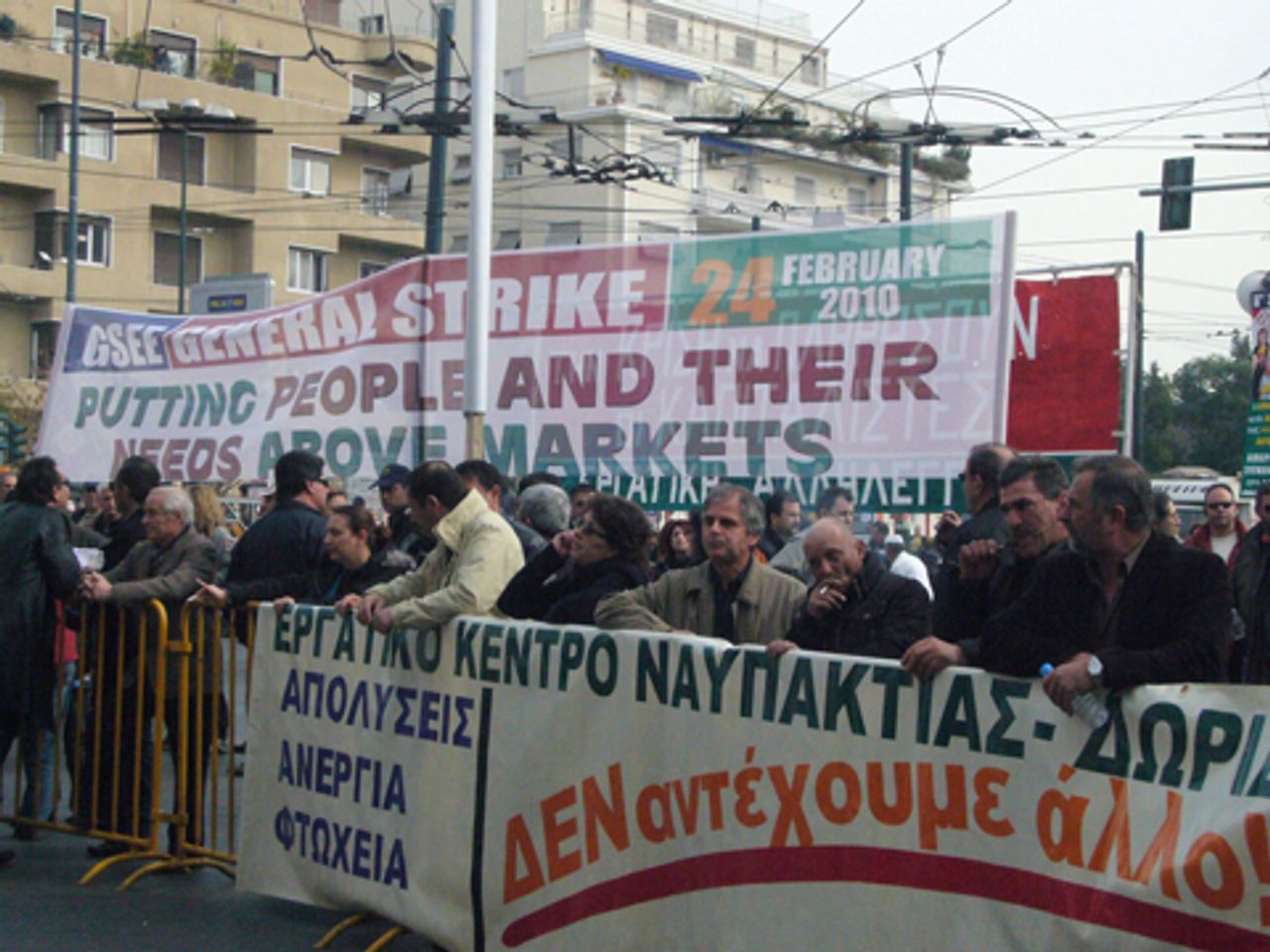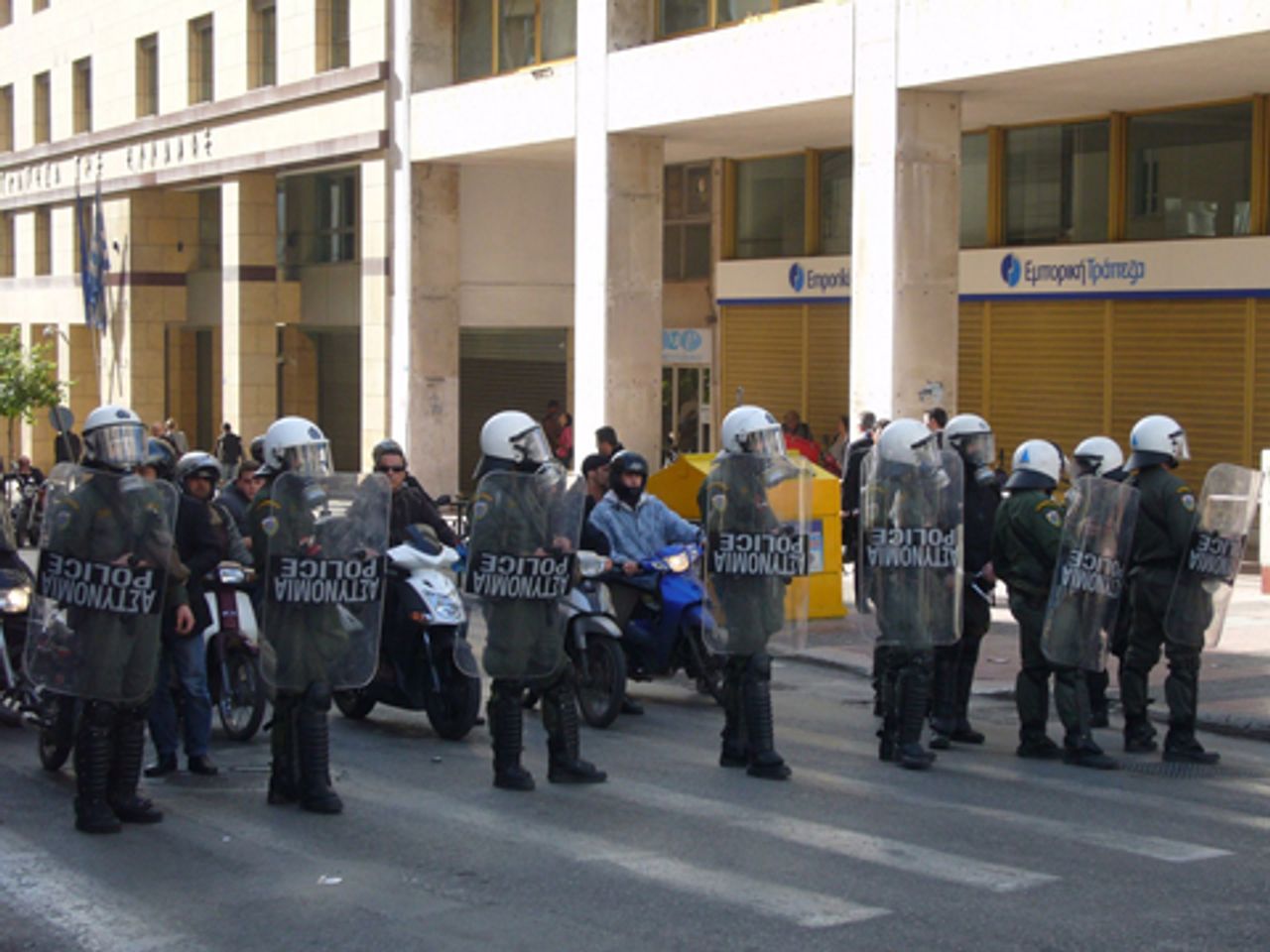Some two million Greek workers participated in a general strike on Wednesday. The mass one-day action was called in response to austerity measures being imposed by the Panhellenic Socialist Movement (PASOK) government of Prime Minister George Papandreou.
 Protesters in Athens march towards the parliament building
Protesters in Athens march towards the parliament buildingElected last October on the basis of populist appeals to working class anger over the policies of the previous conservative government, Papandreou quickly bowed to demands from the European Union and the international banks to impose drastic cuts in jobs, wages and social programs in order to stave off a default of government debt by slashing Greece’s soaring budget deficit.
The strike reflected widespread popular opposition to the austerity program, which is being roundly criticized by the European Commission and financial interests as insufficiently harsh. The mass action brought the country to a virtual standstill.
All flights to and from Greece—with the exception of emergency flights—were cancelled, as air traffic controllers joined the action, forcing the closure of the nation’s main airport, Athens International. Public transportation was severely disrupted, with the Athens metro and bus services running only a skeleton service to allow strikers to get to demonstrations in the city centre. Trains and ferry services ground to a halt.
Public schools, tax offices, courtrooms and other government buildings were closed nationwide, as were public hospitals and other state-run facilities. All the main archaeological and tourist sites were forced to close, including the Acropolis in Athens.
Media workers also struck. Journalists, members of the national journalists’ union, held a 24-hour strike and as a result no newspapers will be published on Thursday. Due to industrial action by media workers, there were no reports of the strike on national television.
The strike takes place within the context of growing working class resistance across Europe to austerity measures now being imposed by governments across the continent—irrespective of whether they are nominally social democratic or conservative.

The previous day, tens of thousands of workers took strike action and protested throughout Spain against government measures to slash pension benefits, including extending the legal retirement age from 65 to 67. The Socialist Party government of José Zapatero is also seeking to implement legislation that would erode workers’ employment rights. A recent poll in the El Pais newspaper found that 84 percent were against the government’s labour “reforms.”
Demonstrations and strikes have also been held in Portugal, Germany, France and Italy over the last few days.
On Monday, pilots employed by the German flagship airline Lufthansa began a four-day strike in opposition to attacks on their jobs and conditions, only to see the action aborted by their union.
In France, air traffic controllers began a four-day strike on Tuesday to oppose the rationalisation of Europe’s air traffic control system. Air France pilots are set to take industrial action on Saturday to protest rationalization measures and job losses, while in the UK, 12,000 cabin crew staff employed by British Airways voted four-to-one in favour of strike action against job losses and other measures associated with restructuring.
On March 1, Czech transport workers are set to strike on all rail and bus routes for five hours in opposition to plans to eliminate benefits, such as cheaper fares. On March 4, public sector workers in Portugal are to strike against the government’s imposition of a wage freeze and attacks on pension rights.
Yesterday’s action was the first general strike since the landslide election of the PASOK government. It was called by the two main trade union federations, covering the private and public sectors respectively—the General Confederation of Greek Workers (GSEE) and the Civil Servants’ Confederation (ADEDY). Together, the two federations represent about half of the five million-strong Greek work force.
While workers who struck and demonstrated expressed militant opposition to all attempts to make them pay for the bankruptcy of the Greek state, union officials indicated that they were ready to enter into talks with Papandreou. Making clear that the unions’ aim is to pressure the government for changes in the austerity package, rather than its withdrawal, Yiannis Panagopoulos, head of GSSE, told the press, “We demand a fair distribution of the burden” of deficit reduction policies.
Spyros Papaspyros, president of ADEDY, said, “We will meet in the next couple of weeks to decide our further action.”
On February16, European Union finance ministers agreed to effectively disenfranchise the Greek population and place the country’s budget under EU scrutiny. This is despite the government’s insistence that it is intent on meeting demands to reduce the public deficit from 12.7 percent of gross domestic product to 3 percent by 2012 in order to comply with EU regulations.
Papandreou has pledged to ensure the deficit is cut to 8.7 percent this year. The cutbacks being implemented are part of a €2.5 billion euro reduction in public spending, and include a wage freeze across the public sector, a 20 percent across-the-board cut in civil-service bonuses, and a two-year increase in the average retirement age.
Other measures set to be introduced shortly include an increase over the current value added tax rate of 19 percent and a hike in fuel, alcohol and tobacco taxes. The EU has also demanded that Athens slash one of two extra months of pay that public sector workers now receive over and above their normal 12-month salary.
On the eve of the strike, the financial markets intensified their pressure on the PASOK government to make even more severe cuts. The ratings agency Fitch downgraded the credit ratings of Greece’s four largest banks, a measure that will make it more difficult for the government to borrow from international banks and investors and avoid default.
Two protest marches were held in the capital—one by the All-Workers Militant Front (PAME), affiliated to the Stalinist Communist Party of Greece (KKE), and the other by the GSEE and ADEDY federations and their affiliated unions.
Approximately 40,000 workers and youth participated in the demonstrations, with many workers bringing handmade placards and chanting slogans, including “The Crisis Should Be Paid for by the Plutocracy,” and “Permanent and Steady Jobs for All.”
Other slogans included “Where Has All the Money Gone?” and “Billions of Euros for Capitalism, but Nothing for the Workers—Rise Up!” Banners read “Keep Your Hands Off Our Benefits,” “People Are More Important than Markets and Banks” and “Enough is Enough!”
 Riot police during the march
Riot police during the marchA section of protesters was attacked by riot police with pepper spray and tear gas near Syntagma Square. The police claimed this was to prevent some of the protesters from entering Athens University. Police brutally beat some of the demonstrators with their truncheons and made several arrests.
In the second largest city, Thessaloniki police estimates reported that some 7,000 people gathered to protest. Demonstrations were also held in other cities and towns.
Even as the protests were taking place, however, the government indicated that it would announce further austerity measures next week. This follows a visit on Tuesday by officials from the European Union, the European Central Bank and the International Monetary Fund. Earlier, IMF chief economist Olivier Blanchard warned that high-debt countries like Greece face an “extremely painful” period of budget tightening that could last up to 20 years and require “sacrifices.”
